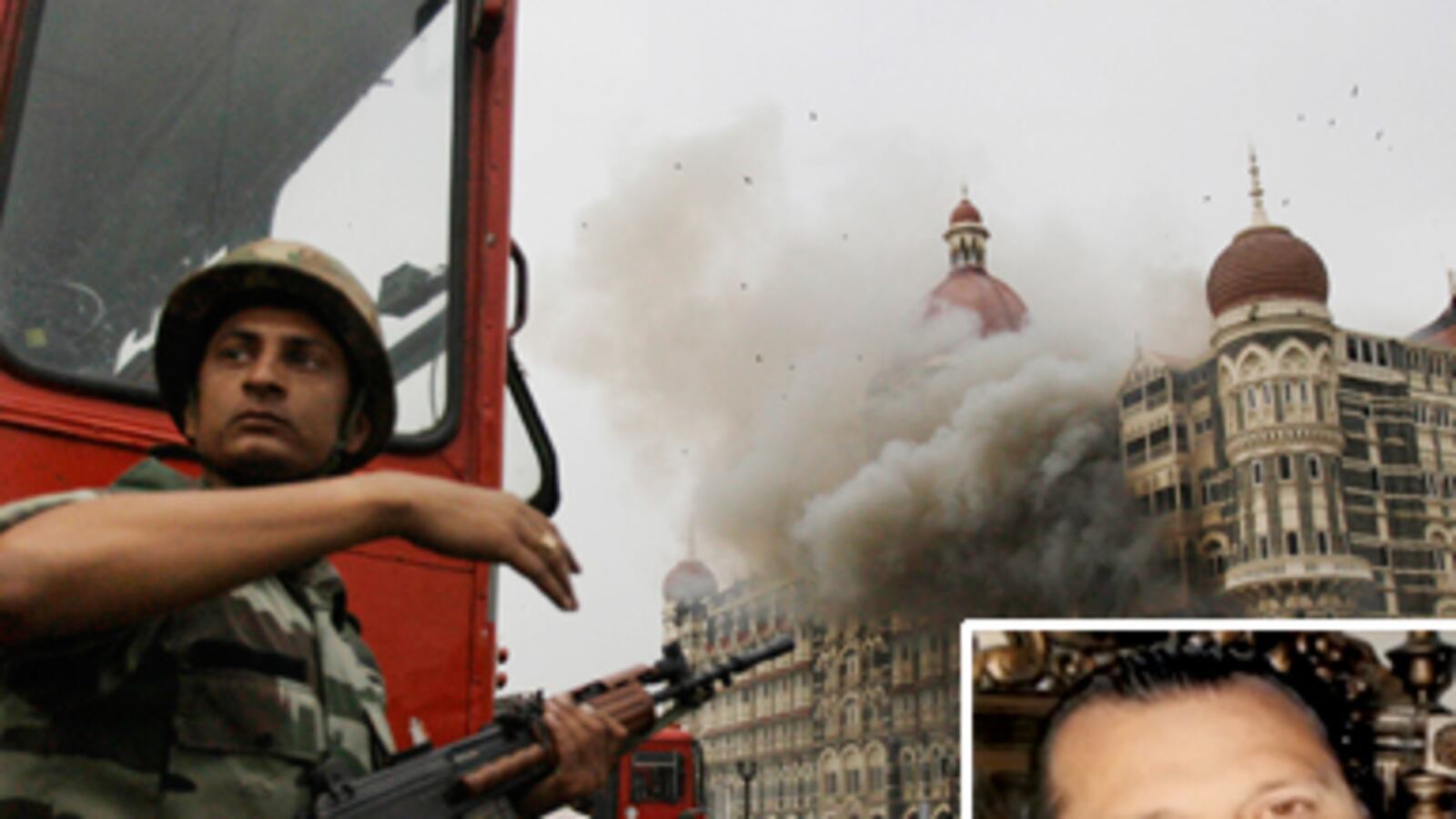By Sebastian Rotella, ProPublica
The life of David Coleman Headley, a confessed American terrorist and Pakistani spy, has moved from a soap opera to a crime story to an espionage thriller embroiling the elites of India, Pakistan, and the United States.
Now begins the most revealing chapter yet: the courtroom drama.

Headley, a Pakistani-American businessman and former DEA informant, will be the star witness against Tahawwur Rana of Chicago, his boyhood friend and alleged accomplice in the 2008 terror attacks on Mumbai. Opening arguments set for Monday have drawn international attention because Headley's testimony could reinforce allegations that Pakistan plays a double game in the fight against terrorism.
The prosecution will depend largely on how the jury views Headley, one of the most intriguing figures to surface in a U.S. terror case. The burly, smooth-talking 50-year-old has a penchant for grandiose dreams and a knack for juggling relationships with multiple wives, terrorist groups, and law-enforcement and intelligence agencies.
"Sometimes he'd tell my husband, 'Oh, I want to be in movies,' a movie star or something like that," Rana's wife, Samraz, told ProPublica in her first-ever interview. "So it looks like he wants to be famous."
“They are using a whale to catch a minnow,” said defense attorney Charles Swift. He called Headley “a master manipulator.”
Headley has gotten his wish. He pleaded guilty last year to conducting reconnaissance for the Mumbai attacks, which killed 166 people, and for a plot against Denmark. His confessions painted a devastating portrait of Pakistan's Inter-Services Intelligence directorate (ISI), which he says helped the Lashkar-e-Taiba terrorist group plot the commando-style attacks on Mumbai.
Rana's defense will center on the ISI links. His lawyers say Headley duped Rana into thinking he was helping an ISI espionage operation in India, then betrayed him to escape the death penalty. Rana, the defense will argue, had no idea Headley was plotting mass murder.
"They are using a whale to catch a minnow," said defense attorney Charles Swift. He called Headley "a master manipulator."
Federal prosecutors recently raised the political stakes by indicting a suspected ISI officer for the murders in Mumbai of six Americans, whose deaths are the basis for the U.S. trial. The officer, identified only as Major Iqbal, allegedly oversaw Headley's scouting in India and then helped launch him on the Lashkar plot against Denmark, although Iqbal is not charged in the Denmark case.
The decision to indict Iqbal was made at high levels in Washington. It sent a tough signal from the Obama administration, which had expressed frustration about Pakistan's reliability even before Osama bin Laden was found in a military town near Islamabad.
"I think [the indictment] shows the government believes Headley when he says his handler was an ISI officer," said James Kreindler, a former federal prosecutor who is suing the Pakistani spy agency in New York on behalf of the Mumbai victims and their families. "At some point in time there is not going to be any doubt whatsoever that the ISI coordinated the attack with Lashkar."
The indictment refrains from mentioning the ISI, part of a calculated low-key approach, according to an Obama administration official who requested anonymity because of the pending trial. But the prosecutors will likely address the allegations about the ISI, especially because the defense has emphasized them.
"The decision not to name the ISI does not reflect second thoughts about the evidence," the official said. "There are no second thoughts about the evidence."
The prosecution's case is based on a secretive international investigation by the FBI and some 30,000 pages of court documents, most of them classified. Headley's testimony is backed by corroborating evidence from other witnesses, communications intercepts, travel records, reconnaissance videos, and the contents of his computer. If there is strong evidence that the ISI helped kill Americans, it would inflict further damage on an endangered alliance with Pakistan into which Washington has poured billions.
Pakistani officials deny any links to terrorism and question Headley's credibility because of his past as a double agent and criminal.
The Pakistani major and five of the six other masterminds charged in Chicago remain at large. The FBI has photos of some of them, intercepts of their voices and emails, and information about their whereabouts, but Pakistani authorities have done little to pursue the fugitives, U.S. officials say. Pakistan's prosecution of several Lashkar chiefs arrested in 2009, including one now under U.S. indictment, has stalled.
Rana, a doctor by training, is the lowest-ranking suspect and the only defendant in Chicago. He is charged with material support of terrorism for letting Headley use his immigration consulting firm as a cover overseas.
Rana has known Headley since they attended an elite military school in Pakistan. Rana's wife, who also has a medical degree, met Headley in the 1990s after she emigrated to the United States. Although he was a convicted heroin dealer and recovering addict, he charmed her conservative family, she said during the interview in their bungalow near Devon Avenue, the heart of Chicago's South Asian community.
The bespectacled 48-year-old mother of three teenagers smiled wearily as she recalled Headley's relationship with her children.
"He was like a gateway to American culture for us," she said. "He was like a second father for my kids… My kids would say, he's cool, this guy. He was taking them to the movies, Chuck E. Cheese, all this fun stuff… He talked to me like a brother. He knows what I liked. He knows what my husband liked. He knows what my children like… He has different faces."
Headley's mother came from a rich Philadelphia family and his father was a renowned, politically influential Pakistani broadcaster. Headley told investigators that he has a distant Pakistani relative who was a former deputy director of the ISI and army general, according to Indian and U.S. officials. If that link is confirmed, it could help explain why the agency later recruited Headley and how he had access to senior officers and militant chiefs.
At 17, Headley returned to the United States, where he managed bars and owned a video-rental store. Multilingual and gregarious, he has shown a con man's gift for winning over accomplices, investigators, and romantic conquests.
"He was a tall, handsome guy," Samraz Rana said. "He was wearing very expensive clothes and, I mean, he was really impressive."
After a 1997 arrest for heroin smuggling, Headley became a prized DEA informant who targeted Pakistani traffickers. In 2001, on the day after the Sept. 11 attacks, the DEA directed him to collect intelligence on terrorists as well as drugs. That December the U.S. government ended his probation early and rushed him to Pakistan, where he began training in Lashkar terror camps weeks later, according to court documents and his associates.
Some federal officials say he remained an informant at least three more years, but the DEA disagrees.
"David Headley was sent to Pakistan for approximately three weeks to further a drug investigation in 1998," said a DEA official familiar with his work as an informant. "He was deactivated in early 2002."
That assertion only deepens the contradictions and mysteries about Headley's missions overseas. Between 2001 and 2008, federal authorities were warned six times by his wives and associates that he was involved in terrorism. None of the resulting inquiries yielded anything. The FBI and CIA say he never worked for them.
Despite Headley's guilty plea, Rana's wife finds it difficult to believe that her jovial, playful family friend helped plan the carnage of Mumbai. She recalled an anecdote her husband told about their military school days, when Headley would avoid morning prayers.
"Dave, he knocks on all the doors of students and he says, 'Get up, get up, it's time for prayer,'" she said. "And then when everybody gets up, he went to his room and went to sleep, you know. So he was laughing. He was like that."
When the DEA busted Headley in 1988 and 1997, Rana put up his house as bond. When the Ranas ran into financial trouble in 2005, Headley came to the rescue with a loan of more than $60,000, Rana's wife said.
"We were like almost at the border of bankruptcy," she said. "So my husband he became more close to him. And he said: 'Oh, he is my true friend because he helped me at this time when I really need money.'"
Still, Headley had traits that made her uneasy. Her husband told her he had once used an elderly aunt to smuggle drugs on a flight overseas, hiding the package in her pocket without her knowledge, the wife said.
In 2006, the ISI recruited Headley in Pakistan, according to his confession. In addition to Major Iqbal, his trainer and handler, he said he met ISI officers named Major Samir Ali, Lt. Colonel Hamza, and Colonel Shah. After specialized ISI training, he did two years of missions in India directed by Iqbal and Sajid Mir, a Lashkar chief who is the suspected project manager of the plot.
Mir's voice was caught on wiretaps overseeing the three-day slaughter in Mumbai by phone. Some U.S. and European anti-terror officials believe Mir once belonged to the military or ISI; others say he only had close ties to the security forces.
Both Mir and Major Iqbal concentrated on terror targets, but Iqbal assigned Headley to gather military intelligence as well. He gave Headley about $28,000 to establish an office of Rana's firm in Mumbai as a cover and for other expenses, the indictment says.
Rana's wife insists that her husband had no idea about the plot. The Ranas traveled to Mumbai, where she has family, days before the attack in November 2008.
"It's a zero percent chance that my husband is involved in this thing," she said. "My relatives are there… I was there. My husband was there. We [could have been] killed in that attack."
The defense, however, will have to explain wiretaps in which Rana appears to praise the Mumbai masterminds. Intercepts indicate he communicated with Major Iqbal. And he helped Headley maintain his cover in Denmark in January 2009 by sending an email to an advertising representative at the Jyllands Posten newspaper, which Lashkar targeted because it had published caricatures of the Prophet Mohammed, according to the indictment.
Major Iqbal met at least twice with Headley about the Denmark plot, expressing enthusiasm about attacking the newspaper, according to Headley's account. The officer cut off contact with Headley when Mir, the lead plotter, backed away from the operation in March 2009, documents say. But Headley continued meeting and communicating with Col. Shah and Major Samir Ali as the Denmark plot was taken over by al Qaeda, according to officials and an Indian court document.
The FBI arrested Headley and Rana in October 2009. A DEA agent who had handled Headley when he was a drug informant was present when investigators brought Headley in, perhaps in a strategy to induce cooperation. Headley quickly did what he had done in the past: He changed sides. He spent weeks detailing his role in the Mumbai massacre.
"If you see him, you cannot even imagine that he can do things like that," Samraz Rana said. "I mean he talks so good. He's so polite."
Now, though, Rana's wife sees Headley as a predator.
"He just thinks about himself," she said. "I think he [studies] human beings… more as compared to the ordinary person. He can understand what [someone] likes and he changes himself according to that… Now I realize what intention he had."
An award-winning foreign correspondent and investigative reporter, Sebastian Rotella worked for almost 23 years for the Los Angeles Times, covering everything from terrorism to arts to the Mexican border. He served most recently as a national security correspondent in Washington, D.C., and his previous posts include international investigative correspondent and bureau chief in Paris and Buenos Aires, with assignments in the Middle East and North Africa.






